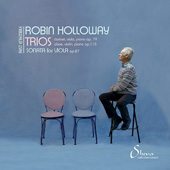
ESSENTIAL RECORDINGS

Robin Holloway (b. 1943) is renowned as a composer, essayist and teacher. His many students include Judith Weir, Huw Watkins, Thomas Ades, George Benjamin, Peter Seabourne, and David Collins. Holloway's early works were complex and modernist. What followed caused much controversy for its radical reengagement with Romanticism, both in gesture and use of tonality. His mature style could be said to forge a path between the two, with excursions more fully into each. This refusal to be constrained is a feature of his musical thinking. A widely commissioned, broadcast and recorded composer, at 75 Holloway remains a major figure, resistant to categorisation and fashion. {Sheva Contemporary}
The above description was best summarized by fellow composer David Matthews when he stated that "Holloway's individual style has been formed by a productive conflict between Romanticism and Modernism." And to my ears, conflict is the key word of that statement, as the music, especially in the single movement Trio for clarinet, viola & piano, Op. 79 constantly ebbs and flows from tonal to atonal, basic to complex rhythms, old logic to new logic. But despite these schizophrenic or contradictory elements, it's Robin Holloway's fine weaving of the various motivic aspects of the work that forms a binding, if at times perplexing thread. This is music that requires attentive participation from the listener. Like a detailed story, if you skip a chapter or even a single page, the plot easily deteriorates. Unlike the old masterworks where you can isolate and replay a specific passage for its beauty or expressive power, this music can't be condensed or dissected into smaller segments and still make sense. The piano part sets the pace from start to finish, prompting the other instruments to follow along its ever increasing agitative state, until the tensions release and the work ends on an enigmatically neo-romantic note.
The Trio for oboe, violin & piano, Op. 115, this time in four movements, opens with a flowing violin melody set against rippling piano figurations, in which all three instruments set off on a shared journey and play off each other and ultimately reach a common goal at the end. Music that somehow reminds me of the chamber music of Mieczyslaw Weinberg. This time around tonality is much more focused, and the trio of instruments are engaged in a far more cooperative give and take, and shared objective which, surprisingly enough, brings the whole work to rest on a fully resolving major triad. No conflicts in sight this time around.
The Rest Ensemble, comprised of Rees Webster on oboe, Oliver Pashley clarinet, Rebecca Raimondi violin, Henrietta Hill viola, and Alessandro Viale on piano, present an engaged and convincing account of this challenging music in what appears to be a world première recording of all pieces. So if you enjoy discovering and hearing new and uncharted music that involves attentive listening, this recording will do. Then again, any music that doesn't seize our full attention, is not worth the paper its printed on.
Jean-Yves Duperron - July 2018